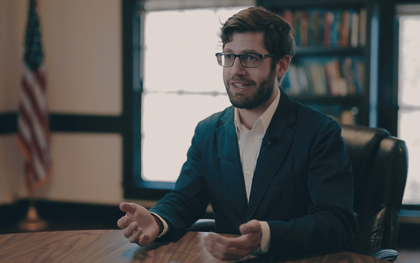
Hello from the mountains for North Carolina!
My name is Kevin Jenson. I do research and development on the theory of Human Centered Learning (www.humancenteredlearning.org), and spend much of my time with an experimental learning community in Black Mountain. This work intersects with my Ph.D. in Learning, Instruction, and Innovation, however, I am also finding out that much of what we study is based on certain ontological and epistemological assumptions that preclude an educational experience focused on the individual instead of the information. By the time I finish my degree, I hope to establish my ability to communicate across the traditional barriers between formal education and fringe education bringing freedom to the first and form to the second, for the only in the balance of the two do I see the emergence of a new, sustainable, liberating, and revitalized approach to modern education.
There are two angles that drive my pursuit of a Ph.D. The first comes from the side of formal education structures which require certain types of evidence and presentation in order to pre-qualify any potential shift in approach or strategy. For example, I have begun to recognize that many of the discussions in literature revolve around an outdated definition of knowledge as information. An example of how far this obfuscation extends with regard to definitions of knowledge may be seen in spelling and grammar checkers like Grammarly, which will suggest various kinds of "synonyms" for the word like understanding or information or data - all of which are incredibly different. New approaches to formal education will need to be based on a definition of knowledge that is supported by adequate research processes (probably conducted by someone with a formal title). I need to know how to speak the language and use accepted methods in order to have a voice among this audience.
The second angle of benefit comes from my personal exposure to a broad range of methods, terms, techniques, methodologies, and frameworks through which I can explain, legitimize, and support the work of creative practitioners who have not enjoyed the luxury of time or interest in deep (and relatively impractical) theoretical explorations. Unfortunately, many innovative structures end up buckling under the weight of growth and becoming more constrictive than they had potential to be liberating. This may happen because the innovation only worked thanks to accidental factors of the environment, or because a particular individual possessed some gift. If innovation is to be scalable, it must be abstracted and shared. Already, my Ph.D. studies have helped to expand my vocabulary and my ability to recognize/name various unique features I recognize in learning environments so they can be analyzed, improved, and shared.
In this way, I see the Ph.D. as valuable to forming a bridge between what I called "formal" and "fringe" educational environments bring freedom to one and form to the other. As I like to say, freedom and form united by love create beauty. 1+1=2
Let's connect!
-Kevin J
My name is Kevin Jenson. I do research and development on the theory of Human Centered Learning (www.humancenteredlearning.org), and spend much of my time with an experimental learning community in Black Mountain. This work intersects with my Ph.D. in Learning, Instruction, and Innovation, however, I am also finding out that much of what we study is based on certain ontological and epistemological assumptions that preclude an educational experience focused on the individual instead of the information. By the time I finish my degree, I hope to establish my ability to communicate across the traditional barriers between formal education and fringe education bringing freedom to the first and form to the second, for the only in the balance of the two do I see the emergence of a new, sustainable, liberating, and revitalized approach to modern education.
There are two angles that drive my pursuit of a Ph.D. The first comes from the side of formal education structures which require certain types of evidence and presentation in order to pre-qualify any potential shift in approach or strategy. For example, I have begun to recognize that many of the discussions in literature revolve around an outdated definition of knowledge as information. An example of how far this obfuscation extends with regard to definitions of knowledge may be seen in spelling and grammar checkers like Grammarly, which will suggest various kinds of "synonyms" for the word like understanding or information or data - all of which are incredibly different. New approaches to formal education will need to be based on a definition of knowledge that is supported by adequate research processes (probably conducted by someone with a formal title). I need to know how to speak the language and use accepted methods in order to have a voice among this audience.
The second angle of benefit comes from my personal exposure to a broad range of methods, terms, techniques, methodologies, and frameworks through which I can explain, legitimize, and support the work of creative practitioners who have not enjoyed the luxury of time or interest in deep (and relatively impractical) theoretical explorations. Unfortunately, many innovative structures end up buckling under the weight of growth and becoming more constrictive than they had potential to be liberating. This may happen because the innovation only worked thanks to accidental factors of the environment, or because a particular individual possessed some gift. If innovation is to be scalable, it must be abstracted and shared. Already, my Ph.D. studies have helped to expand my vocabulary and my ability to recognize/name various unique features I recognize in learning environments so they can be analyzed, improved, and shared.
In this way, I see the Ph.D. as valuable to forming a bridge between what I called "formal" and "fringe" educational environments bring freedom to one and form to the other. As I like to say, freedom and form united by love create beauty. 1+1=2
Let's connect!
-Kevin J